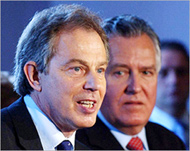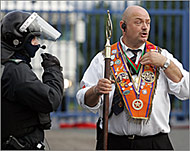Protestant riots rock Belfast
Protestant extremists in Northern Ireland have attacked police and British troops in a second night of furious rioting over a restricted parade, leaving streets littered with rubble and burned-out vehicles.

Crowds of masked men and youths confronted police backed by British troops in dozens of Protestant districts in Belfast and several other towns.
Armed men opened fire on police and soldiers in at least two parts of the capital on Sunday night, but nobody was hit.
Riot-hardened police units equipped with helmets, body armour and flame-retardant jumpsuits doused crowds with massive water cannons and fired several hundred plastic bullets.
The Police Service of Northern Ireland said 18 more officers were injured on Sunday night and Monday morning, chiefly by shrapnel from rioters’ homemade grenades, bringing the force’s three-day total to 50.
“This is a moment of choice for everybody… Whose side are you on?” said the British governor, Northern Ireland Secretary Peter Hain.
“Are you on the side of law and order, applied fairly and equally to every citizen?
“Or are you against law and order, siding with those firing bullets at the police, throwing petrol bombs and blast bombs at police and attacking them?” Hain said after receiving a detailed intelligence briefing on the weekend chaos from Northern Ireland‘s police commander, Chief Constable Hugh Orde.
Ceasefire
Hain said Orde and senior detectives had presented “absolutely clear-cut” evidence that members of Northern Ireland‘s two biggest outlawed Protestant groups, the Ulster Defence Association and the Ulster Volunteer Force, were instrumental in directing the riots.
He said he planned to announce within days whether Britain would continue to recognise the legitimacy of the joint UDA-UVF ceasefire, which has officially existed since 1994.
 |
|
Hain (R) will announce Britain’s |
Sixteen Protestants arrested during the riots began their court appearances on Monday to face a wide range of charges, ranging from hijacking vehicles to attempted murder.
One Protestant man who had been shot in the arm on Sunday by British troops was arrested on suspicion of attempted murder.
Orde has accused the Orange Order – a legal brotherhood with more than 50,000 members – of inspiring the riots. The violence began on Saturday when police prevented Orangemen from parading near a hardline Catholic part of west Belfast.
The senior Orangeman in Belfast, county grandmaster Dawson Bailie, said on Monday he would not condemn the rioters’ actions.
“As far as I am concerned, the people to blame are the secretary of state, the chief constable and the parades commission,” Bailie said, referring to Hain, Orde and a joint Catholic-Protestant panel that since 1998 has imposed restrictions on Protestant demonstrations.
Leaders criticised
The US envoy to Northern Ireland, Mitchell Reiss, was unusually harsh in his criticism of Protestant political leaders, whom he accused of offering half-hearted, ambiguous backing for the police.
 |
|
Members of the Orange Order (R) |
Reiss said Protestant leaders should not be eligible to serve in any future power-sharing government – the central, unfulfilled goal of Northern Ireland‘s seven-year-old Good Friday accord – unless they stood firmly behind the police and against their voters in the mobs.
“All of us are pretty disappointed with the abdication of responsibility by many [Protestant] unionist leaders,” Reiss said during a visit to Belfast.
Rebellion
Police and analysts agreed that the march provided a pretext for the UDA and UVF to launch a pre-planned rebellion against police authority. Their desire for street mayhem reflected their nearly total disconnection from the peace process.
Both are supposed to be observing ceasefires and disarming in support of the peace pact, like the outlawed Irish Republican Army rooted in Catholic areas.
But while the IRA has built a support base through its Sinn Fein party and has grown central to negotiations, the Protestant paramilitary groups have failed to win electoral support and barely register in political talks.
Instead, they wield power through criminal graft backed by occasional intimidating shows of force.